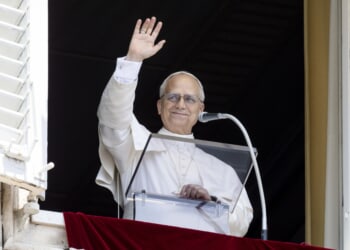James Ford is a columnist for City AM and a former advisor on transport policy to then Mayor of London Boris Johnson
In every spending review there are winners and losers. Stars rise, Cabinet careers are made, and political reputations forged on an ambitious politico’s ability to secure Treasury funding for flagship policies and vote-winning initiatives. The big winners from the 2025 Spending Review are clear: the Health Secretary, the Deputy Prime Minister, the Defence Secretary, and the Metro Mayors. The losers are equally obvious; in this case they include DEFRA Secretary Steve Reed (with his department’s day-to-day spending cut by 2.7%) and Foreign Secretary David Lammy (awarded a ‘success rating’ of 1/10 in the Guardian’s analysis). Unfortunately for London, the biggest loser is painfully apparent: the Mayor of London.
That is not to say that London comes away entirely empty-handed, but even these apparent wins are overshadowed by the much bigger wins for other cities and come with heavy caveats. For example, although the Met will benefit from the boost in spending power granted to all UK police forces, City Hall has warned that police numbers in the capital are still likely to fall. Whilst Transport for London (TfL) got the multi-year funding settlement it has long craved, it was for four years and not the five year term that other city regions secured. There was an extra £2.2bn for TfL capital renewal programmes, but that is notably less than either the £2.5bn awarded to Greater Manchester (part of the £15bn awarded to mayors in the Midlands and North for transport projects) or the massive £25bn allocated for HS2. Perhaps most egregiously, London tied with Blackpool for the number of times it was named by the Chancellor in her speech (three times apiece, in case you weren’t counting). Little wonder, then, that the Evening Standard, City AM, and The Economist all concluded that London had been “short-changed.”
It was clear from the pre-Spending Review briefing by City Hall that Sadiq Khan’s main objective in this spending round was to secure the funding for two long-delayed transport projects: the Bakerloo Line extension to Lewisham and the DLR extension to Thamesmead. Whilst the Treasury has not said these projects will never go ahead, it is clear that neither project will be progressing in this spending round with central government funding.
The scale of Khan’s failure is particularly galling as he had set the bar for himself rather low to begin with. The Bakerloo and DLR extensions are not the top prize on London’s transport infrastructure wish list. That is Crossrail 2 (otherwise known as the Chelsea-Hackney line), which is proposed to comprise 47 new or expanded stations and connect New Southgate and Broxbourne in the north to Epsom, Chessington and Shepperton to the south west. According to TfL estimates, Crossrail 2 would create 200,000 jobs, act as the catalyst for the construction of 200,000 homes, and boost London’s transport capacity by ten per cent. Truly transformational stuff. However, Crossrail 2 was projected to cost £41.3bn back in 2019 (which is more than double the £18.8bn that the Elizabeth Line ended up costing). By contrast, the DLR extension is estimated to cost £1bn (at 2022 prices), create 10,000 jobs and support the construction of up to 30,000 homes. The Bakerloo extension comes with an expected price tag of between £5.2bn and £8.7bn (based on 2021 prices), create 9,700 jobs and deliver around 20,400 homes.
Khan’s epic failure to persuade his colleagues in the Labour Government to back his administration with a serious injection of extra funding is set to have profound consequences for London economically and Khan politically. It is not just that nearly 200,000 jobs will not be created and 200,000 homes will not get built. The Mayor had staked his entire plan for growing the capital’s economy on two pretty big assumptions: that Labour would deliver growth nationally and that Khan would be able to leverage significant investment from the Starmer Government. Launched with much fanfare just a few months ago, the London Growth Plan set out Khan’s intention to “turbocharge” London’s economy to the tune of £107bn over the next decade, create 150,000 jobs, boost the exchequer by £27bn, and put £11,000 a year more in Londoners’ pockets. With the government so far failing in its core ‘Growth Mission’ and City Hall denied the bulk of the funding it was seeking for the lifetime of this Parliament, those plans are now in tatters.
As grim as London’s prospects are in the short term, they are also unlikely to improve in future spending rounds. The Chancellor has made it clear that she is changing the Green Book, the guidance that the Treasury uses for evaluating projects, to ensure that schemes outside London and the South East will stand a better chance of securing funding than they have previously. This means that the deck will be stacked against the capital from now on.
The political consequences of further set-backs in delivering new homes and additional delays to already long overdue transport projects coupled with a lack of progress on getting Londoners their promised £11,000 personal cash boost by the time the capital next goes to the polls in 2028 will no doubt weigh heavily on the mind of senior figures in the Mayor’s office. Indeed, this Spending Review may well mark the moment when Khan started considering a future after City Hall.
The net result of the Spending Review is that the Mayor of London cannot deliver on his flagship growth plan. Important infrastructure projects have not just stalled but languished on his watch. Crime looks set to continue to rise in the capital. And now he can’t even persuade his Labour colleagues in Cabinet to take him seriously or trust him with taxpayers’ money. Londoners are entitled to ask: what, exactly, is the point of Khan?


![Former Bravo Star Charged After Violent Assault Using a Rock-Filled Sock in Tennessee Walmart [WATCH]](https://www.right2024.com/wp-content/uploads/2025/07/Former-Bravo-Star-Charged-After-Violent-Assault-Using-a-Rock-Filled-350x250.jpg)




![Karoline Leavitt Levels CNN's Kaitlan Collins and Other Legacy Media Reporters [WATCH]](https://www.right2024.com/wp-content/uploads/2025/07/Karoline-Leavitt-Levels-CNNs-Kaitlan-Collins-and-Other-Legacy-Media-350x250.jpg)
![Man Arrested After Screaming at Senators During Big Beautiful Bill Debate [WATCH]](https://www.right2024.com/wp-content/uploads/2025/06/Man-Arrested-After-Screaming-at-Senators-During-Big-Beautiful-Bill-350x250.jpg)
![Illegal Alien Walked Free After Decapitating Woman, Abusing Corpse for Weeks [WATCH]](https://www.right2024.com/wp-content/uploads/2025/07/1753013138_Illegal-Alien-Walked-Free-After-Decapitating-Woman-Abusing-Corpse-for-350x250.jpg)







